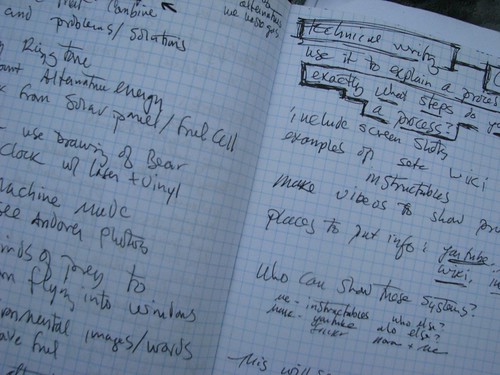Idea Capture with Writing

One of the things that I do is to reflect on the things that I do and write them up. As I write, I get more questions, and more clarity. I consider you to be my collaborators in education at this point, and value your opinion. It may be that I raise questions and observations that you share as well. If that is the case, then it would be very helpful to have a dialogue.
In reading the grants that funded the program this year, I did see several references to growth of the program to other programs and other cities. If that is to happen, we must make a trail of information for future program leaders and participants to follow. If we are to recruit teachers and organizers into the fold, then we need to have something to point to so we can show them the way we think about teaching, learning, organizational structure and the topics we cover in the program. We cannot rely on oral history to spread the word of how the program works. At some point, there must be a manual of sorts written so that others can emulate the policies, techniques and community building that has gone on at SETC for so many years.
While it is very important for the youth leaders and participants to write about their techniques and experiences, it is also important and essential that the adult leaders find ways of writing accessibly about their beliefs and techniques of how these programs and systems work and don't. There really should be a place for the adult leaders and mentors to share their ideas, theories experiences and dreams about the programs. It could be a great benefit in ways that we can't quite see at this time. The writing does not have to be extensive, and can be pointers to the important work of others.
It is my belief that the more that is written, the better. The reasons for writing are several:
Writing helps you remember
If you write something in a trusted place where you know you can access it again, you can stop trying to remember it. Your system remembers it for you. You can use email conversations, which can be archived. You can put it online in a blog or wiki, and make sure that the account stays active for as long as you need it. You can write it in a notebook and hang on to the notebook for as long as you need it. You can use loose pieces of paper to write it on, and keep the paper as long as the information is valuable. Using the writing, you can come back to an idea hours, days months or even years later when you need the idea again.
Writing helps you think
As you write, new ideas and questions come to mind. These will give you a better understanding of the issues you face. It may be that the solution comes to you as you write, or you get a clearer view as you write about it. It may be that you come up with other parts of the issue show up in the form of questions to ask and find out about.
Writing saves you time
In the learning style we are advocating, participants get what they need when they need it. If somebody comes to you with a question and you have ten minutes, a half hour or an afternoon to answer it, then you do it right then. But what if people keep coming to you with the same question? It is better in that case for you to write it up and make it accessible. Then when people get in the habit of reading and researching in addition to speaking and using conversation to gather information, then they will come to you with better and more informed questions.
Writing can evolve as the ideas evolve
As people's beliefs, opinions and experience evolve with time, it is possible and advisable to go back and refine the written body of work. As ideas change, then they can be updated. If an idea becomes outdated, then it can be ignored and not read, or it can be rewritten to reflect the new thinking. Where the writing resides can make a difference to. It is possible to place greater or lesser prominence on it by showcasing it in various ways, like printing it out, putting it on the front page, quoting it in a blog entry and more.
Labels: constructionism, creativity, education, idea, ideacapture, writing
